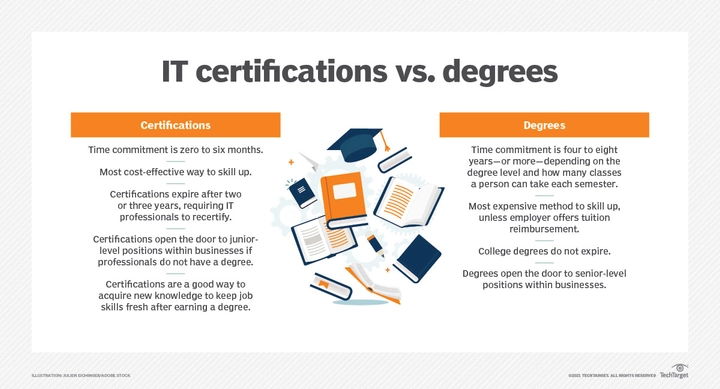Don’t have a post-grad plan? We’ve got you covered…

Are you dreading a full season of graduation parties where you’ll be asked endlessly “So, what are your plans now?” If the “traditional” path of pursuing a four-year college degree is not for you, you might be surprised to learn you’re in good company. According to one study, a third of Americans (34 percent) had no life plan after completing school, whether it was high school or college.
Here at ACI Learning we can help you answer that dreaded question all summer long. In fact, we can lay out a path for you to become trained and certified in a full time IT career before most of your peers have even finished their first (expensive) year of college. In short – we’ve got you. Follow along for the answer to your summer fears…
Before we dive in, let’s take a minute to reflect on your personal goals and interests. Here are some things to consider:
- Before embarking on any career path, it’s essential to identify your interests and goals. What do you enjoy doing? What kind of work do you see yourself doing in the future? What skills do you want to develop? Answering these questions will help you determine the right IT career path for you.
- Once you’ve identified your interests and goals, research the IT field. Learn about the various IT jobs available, including what skills and education are required for each job. This will help you make an informed decision about which IT career to pursue. (We’ll help you with that later on in this blog).
- While some IT jobs don’t require a college degree, some do. Therefore, it’s crucial to obtain the necessary education to qualify for your desired IT career. There are several educational paths to consider, such as earning an associate’s degree, bachelor’s degree, or technical certifications.
- Gaining experience is an essential aspect of starting a career in IT. Consider internships, apprenticeships, or part-time work to gain experience in the IT field while pursuing your education. This experience will help you stand out to employers.
- Networking is essential in any industry, including IT. Attend IT-related conferences, meetups, and events to build your network. Connect with professionals in your desired IT field on LinkedIn or other social media platforms. These connections can be valuable when seeking job opportunities or advice.
An in-demand career path
If you’re a high school graduate and wondering what to do next, a career in IT can be a smart choice, as it offers many opportunities for growth, financial stability, and job security. The IT field is growing rapidly and if you follow the right steps to get started, it should deliver you a lucrative livelihood with plenty of opportunity in the future: Tech is an industry where opportunities outpace growth, meaning hiring managers are motivated to incentivize roles to attract, retain and promote. Gartner's latest global technology forecast predicts IT services will expand 7.9 percent in 2023 to $1.3 trillion.
Why certifications?
In the world of IT, certifications are considered the best way for employers to verify the skills and knowledge of a new hire. Certifications are ideal for those looking to change careers quickly, because they can be achieved in a much shorter timeline than a degree.
Ultimately, a certification is a great, cost-effective way to get into the lucrative IT field for a fraction of the cost of a university. With the continuing upward trend in salaries, the IT industry is not going anywhere anytime soon.
Should I get a degree, or should I get a certification?

If you're looking to further your knowledge in IT-related fields, there are two paths to take -- certifications and degrees. Certifications are a way to validate your skills in an area important to an employer as part of a hiring or even promotion process. It is important to note that in technology related fields, your training does not end with a certification or degree, so a training program – even for picking up or developing skills – should always be part of your professional resources.
Where to begin
IT professionals typically begin their career path in the same place: CompTIA, the Computing Technology Industry Association, is a nonprofit trade organization based in the U.S. that has developed and administered professional IT certifications for over 20 years. One of the most widely recognized beginner certifications is the CompTIA A+ certification, which is separated into two sections, the core 1 and core 2 certifications. Just earning the certification can open doors into most entry-level IT positions and supply potential promotions for those already in the field. If you’re looking to kickstart your IT career, this is the path for you.
At ACI Learning, we are proud of our status as an official training partner of CompTIA.
How long will it take me to complete training?
CompTIA Security+
Certification: CompTIA Security+
Base Training Period: 10 days
Skill Level: Beginner
Recommended Experience: None is needed
The information and activities in this course help you build your computer security skill set so you can confidently perform your duties in security-related roles. If you’re an IT professional with networking and administrative skills in Windows®-based Transmission Control Protocol/Internet Protocol (TCP/IP) networks; familiarity with other operating systems, such as macOS®, Unix®, or Linux®; to further an IT career, this is the next course for you. You will learn and use fundamental security principles to install and configure cybersecurity controls and participate in incident response and risk mitigation.
Certified Network Defender
Certification: CND
Base Training Period: 10 days
Skill Level: Intermediate
Prerequisites: CompTIA Security+
If you've completed Security+ and want to keep building your resume and knowledge base, Certified Network Defender can be completed in one week and is a HUGE step up from Security+. Certified Network Defender (CND) is a vendor-neutral, hands-on, instructor-led comprehensive network security certification program created by EC-Council. This tactical network security training course prepares network administrators to defend their networks from intrusion. Through this course, you'll gain a hands-on understanding of data transfer, network technologies, and network software needed to secure a network.
Roles you'll be qualified for: Network Administrator, Network Security Administrator, Network Security Engineer, Network Defense Technician, and Security Analyst
Certified Ethical Hacker
Certifications: CEH
Base Training Period: 10 days
Skill Level: Intermediate
Prerequisites: CompTIA Security+
If you enjoy detective work and want to get inside the mind of a hacker, this is the perfect program for you. Certified Ethical Hacker (CEH) will provide a thorough understanding of the attack vectors and methods of hackers.
Next steps: Beginner roles, getting hired
Once you complete your IT training, what kind of job can you expect to get? Beginner roles in IT typically center around the Help Desk. These jobs require things triage work, where you’ll help identify, troubleshoot, and fix basic IT issues. If you like solving problems, working with technology, and helping people, starting in an IT support role could be ideal.
Other common entry-level IT job titles include technical support specialist and desktop support specialist. Our Computer User Support Specialist program is designed to help those with no experience qualify for entry IT support roles like these.
Salary expectations for beginners
You can find the starting salary midpoints for technology professionals in the latest Robert Half Salary Guide. While salaries can vary based on factors such as location and experience, the guide estimates that a midpoint starting salary for a Tier 1 Help Desk employee would be around $57,350.
As an IT career progresses, the difference in salary often comes down to specialization: Employers may increase salaries between five to ten percent for professionals with sought-after certifications, skills and abilities.
Growing throughout your career
Your career path within IT will likely lead you away from the Help Desk at some point, and that is when you’ll need to consider how you might want to specialize your skills. IT career paths include networking, cyber, IT support, and project management. Let’s take a more detailed look at these job descriptions and what types of additional certifications you would want to pursue for each:
Networking - Networking is arole that focuses on computer communications between software and hardware devices. The network, servers, and systems are what allow businesses to function normally. Both CCNA and CompTIA Network+ are popular networking certifications.
Cybersecurity - Cybersecurity analysts protect computer networks from cyberattacks and unauthorized access by trying to anticipate and defend against cyber threats and responding to security breaches. Cyber experts play an important role in protecting data. Common cybersecurity certifications include certified ethical hacker, certified information security manager, CompTIA Security + and CISSP.
IT support - IT Support Specialists are responsible for analyzing, troubleshooting and evaluating technology issues. This role may support internal clients, helping to keep employees productive, or external customers of a company, helping them via the telephone or webchat. CompTIA A+ is among the most common certifications within this field.
Project management - A project manager organizes, plans, and executes IT projects while working within budgets and schedules. Common certifications in the field include PMP and ITIL, both of which are included in our Senior Technology Project Manager Program.
Why ACI Learning Tech Academy?
Training should never be a lonely experience. We plug you into a network of passionate subject matter experts who are invested in your career path.
- Flexible Schedules
- Instructor Led
- Practice Labs
- Career Services support
- ACE college credit recommendation
If you're ready to take the next step in your career, fill out the form below or contact us here.
